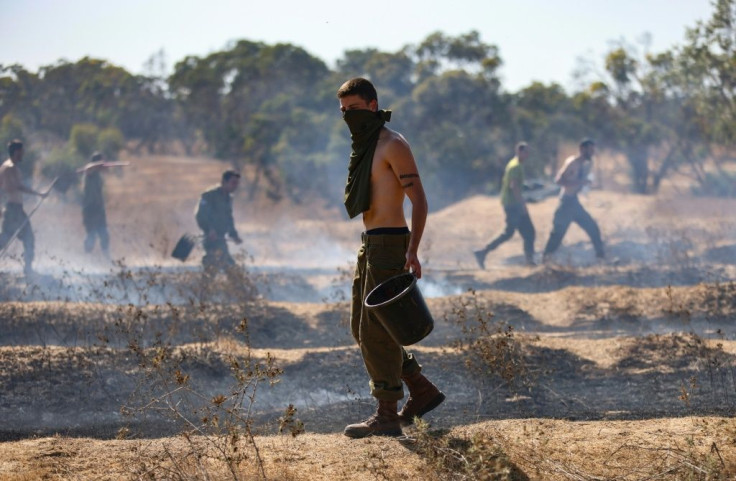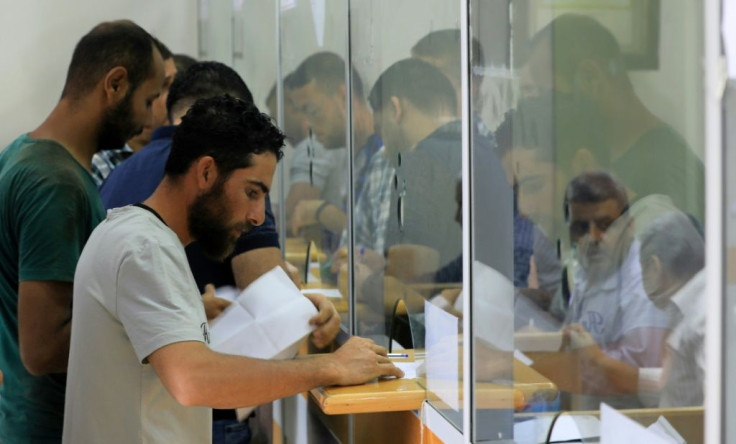Israeli Planes Hit Gaza After Rocket Fire
Israeli planes launched raids against Gaza late Thursday in response to rocket fire, as mediators sought to broker an end to the latest flare-up.
Rockets were fired at Israel but crashed inside the Palestinian enclave, according to witnesses and Gaza security sources.
Palestinian sources reported light damage but no casualties after the raid in Khan Yunis, southern Gaza.
The latest exchanges followed anti-tank fire by the Israeli army in the morning against Hamas, the Islamist group that controls the Gaza Strip.
The Israel Defense Forces confirmed the air strikes on Twitter.
"Our Air Force just struck a Hamas military compound used for rocket ammunition manufacturing in Gaza in response," the IDF wrote.

"We hold Hamas responsible for all terror activity emanating from Gaza," it added.
Israel has bombed Gaza almost every night since August 6 in retaliation for the balloons or, less frequently, rocket fire, from across the border.
It has also tightened its 13-year blockade of Gaza's two million inhabitants.
It has banned Gaza fishermen from going to sea and closed its goods crossing with the territory, prompting the closure of Gaza's sole power plant because of a lack of fuel.
"Explosive and arson balloons were launched from the Gaza Strip into Israel," a military statement said early Thursday.
"In response... tanks targeted military posts belonging to the Hamas terror organisation in the Gaza Strip."
Gaza security officials said the fire hit Hamas observation posts near Al-Maghazi and Al-Bureij refugee camps and the town of Khan Yunis, without causing casualties.

Since the exchanges erupted two weeks ago, Israeli reprisals had mainly involved warplanes, and Gaza security sources said the switch to tanks could be an attempt to de-escalate.
The reprisals came after an Egyptian delegation shuttled between the two sides, trying to broker a return to an informal truce.
One of just two Arab countries to have signed a peace treaty with Israel, Egypt has acted to calm repeated flare-ups in recent years to prevent any repetition of the three wars they have fought since 2008.
The latest ceasefire, which has already been renewed several times, is bolstered by millions of dollars in financial aid from Qatar to Gaza.
But complaints from Hamas that Israel has failed to live up to its side of the bargain have been accompanied by sporadic flare-ups on the border.
The truce provided for permits for Gazans to work in Israel and financing for Gaza development projects, both measures that would provide some economic relief in an impoverished territory where unemployment exceeds 50 percent.
Sources told AFP the twin issues were at the root of the latest flare-up.
A source close to Hamas said the Israeli government told the Egyptian delegation it expected a "return to calm" before considering implementation of truce provisions such as "the extension of the eastern Gaza industrial zone" and the construction of a new power line to the territory.
Hamas has asked for the number of work permits issued to Gazans to be doubled to 10,000 once anti-coronavirus restrictions are lifted, the source said.
The truce also stipulated a monthly aid payment from Qatar of $30 million until the end of next month but the source said Gaza's Gulf benefactor had "agreed to increase the financial subsidy by $10 million per month" and extend its timeframe.
The chairman of the Qatar committee for the reconstruction of Gaza, ambassador Mohammed Al-Emadi, spoke Wednesday of "intensive efforts to contain the escalation" between Israel and Hamas.
On Thursday morning, Qatar did not comment on its aid to Gaza.
© Copyright AFP 2024. All rights reserved.




















